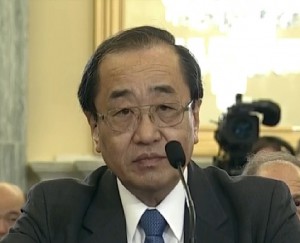
Hiroshi Shimizu, Takata's senior vice president of quality assurance, said the company doesn't think a national recall of its airbag inflators is needed despite evidence to the contrary.
Takata Corp. executives during a U.S. Senate subcommittee hearing today said there is no need to expand its recall of 7.8 million vehicles with faulty airbag inflators from a regional action to a national effort, despite a rising number of deaths and injuries due to the airbags.
Prior to the hearing, two senators, Richard Blumenthal (D-Conn.) and Edward Markey (D-Mass.), offered evidence that the airbag explosions can happen outside the regional recall area, suggesting that a woman was killed by the airbag in 2004 in Arizona while driving one of the affected vehicles. Arizona is not one of the states in the regional recall.
After being roundly criticized by politicians and safety groups for its past handling of recalls as well as mounting evidence – including an investigative piece by TheDetroitBureau.com – that regional recalls are ineffective due to the transient nature of vehicles, the National Highway Traffic Safety Administration (NHTSA) acquiesced and recommended Takata and the 10 automakers involved expand the recall to national status.
In fact, it did more than that, suggesting it “will use the full extent of its statutory powers to ensure vehicles that use the same or similar airbag inflator are recalled.”
In addition to saying it felt opening the recall up nationally was unnecessary, Takata officials failed to accept full responsibility for five deaths and dozens of injuries resulting from faulty airbag inflators.
Hiroshi Shimizu, Takata’s senior vice president for global quality assurance, was asked during the hearing, “Does Takata take full responsibility for this defect?” and responded by saying that the accidents were anomalies, “so in that sense, yes.”
Shimizu incurred the wrath of Sen. Edward Markey (D-Mass.) later in the hearing, when Markey asked him if he supported expanding the current regional recall of vehicles with a national action.
The executive essentially gave a non-answer saying, “It is hard for me to answer yes or no.” After struggling to give a more coherent answer, a clearly angry Markey cut him off say, “I’m going to take that as a no.”
Shimizu did begin his testimony by apologizing for the problems with the airbags saying he was deeply sorry and that he was “anguished about each of the reported instances in which a Takata airbag has not performed as designed, and a driver or passenger has suffered personal injuries or death.”
He added that Takata believes causes of the airbag inflator problems are a combination of three factors: the age of the inflator, persistent exposure to high humidity and problems in production.
Many of the senators were unmoved by Shimizu’s apology and insight into the possible problem.
“We now have a new problem that we are addressing, which is in effect a live hand grenade in front of a driver and a passenger,” said Senator Bill Nelson (D-Fla.), who chaired the hearing.
(Limited “geographic recalls” could put millions of motorists at risk. To see the exclusive report from TheDetroitBureau, Click Here.)
The problem has led to the recall of 7.8 million vehicles in the U.S. produced by 10 different manufacturers, with Honda having the biggest exposure with an estimated 2.8 million vehicles worldwide.
While NHTSA issued a statement imploring Takata and the affected automakers to expand the recall to a national action, safety officials recognized that move could create a new problem.
(Click Here for details about NHTSA hitting Takata with a second demand for airbag information.)
“At this point, a national recall of all Takata air bags would divert replacement air bags from areas where they are clearly needed, putting lives at risk,” said NHTSA Deputy Administrator David Friedman.
(To see more about NHTSA demanding Takata expand the recall from a regional action to a national one, Click Here.)
Takata said it can produce 450,000 replacements each month, but the vehicles that are at the biggest risk are those in states with high humidity and getting those vehicles repaired is a priority, suggested Friedman.
It’s unknown how many more vehicles would need to be repaired if the recall were national, but it’s safe to say it would number in the millions.

This is probably the worst approach Takata could take.
Takata has reached out to other airbag mfgs. to see if they can help supply replacement units. No company can just whip up a few million extra replacement airbags so this is going to be a long, drawn out recall – if Takata doesn’t fold their tent and just call it a bad day.